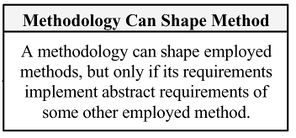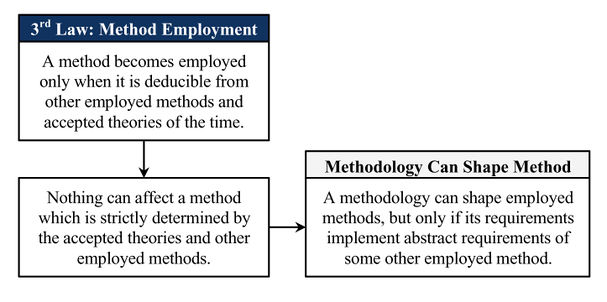Role of Methodology in Scientific Change
What role do methodologies play in scientific change? Are methodologies capable of affecting employed methods?
TODO: Description
In the scientonomic context, this question was first formulated by Hakob Barseghyan in 2015. The question is currently accepted as a legitimate topic for discussion by Scientonomy community.
In Scientonomy, the accepted answer to the question is:
- A methodology can shape employed methods, but only if its requirements implement abstract requirements of some other employed method.
Contents
Scientonomic History
Acceptance Record
| Community | Accepted From | Acceptance Indicators | Still Accepted | Accepted Until | Rejection Indicators |
|---|---|---|---|---|---|
| Scientonomy | 1 January 2016 | This is when the community accepted its first answer to this question, Methodology Can Shape Method theorem (Barseghyan-2015), which indicates the question is itself legitimate. | Yes |
All Theories
| Theory | Formulation | Formulated In |
|---|---|---|
| Methodology Can Shape Method theorem (Barseghyan-2015) | A methodology can shape employed methods, but only if its requirements implement abstract requirements of some other employed method. | 2015 |
If an answer to this question is missing, please click here to add it.
Accepted Theories
| Community | Theory | Accepted From | Accepted Until |
|---|---|---|---|
| Scientonomy | Methodology Can Shape Method theorem (Barseghyan-2015) | 1 January 2016 |
Suggested Modifications
Current View
In Scientonomy, the accepted answer to the question is Methodology Can Shape Method theorem (Barseghyan-2015).
Methodology Can Shape Method theorem (Barseghyan-2015) states: "A methodology can shape employed methods, but only if its requirements implement abstract requirements of some other employed method."
A methodology can affect an employed method when it implements one or more abstract requirements of another employed method. Thus, the role normative methodology plays in the process of scientific change is a creative role, in which methods are changed through the implementation of other abstract requirements from some other employed method.
This theorem follows from former description of the third law, which states that a method becomes employed only when it is deducible from other employed methods and accepted theories of the time.
This description of the third law leaves room for methodologies’ to play an active role in scientific change in cases when a concrete method fulfills the requirements of an employed abstract method. The same abstract requirements can usually be implemented in a wide range of different ways. For instance, if there is a whole array of concrete cell counting methods all implementing the same abstract requirement that when counting the number of cells, the resulting value is acceptable only if it is obtained with an "aided" eye.1pp. 151-152 In such cases, methodology can play a decisive role in method employment; what later becomes the requirements of the employed method can be first suggested as a methodology. Thus, the double-blind trial method was first devised as a methodology, as a set of explicitly stated rules, and only after that did it become actually employed as a method of drug testing.1pp. 240-243
Sebastien (2016)'s new definition of methodology offers an alternate means for methodologies to shape methods, although this is not stated in the existing formulation of the theory. Because methodology is understood as a subkind of Normative Theory, it should be possible for the Third Law to deduce an abstract method from a set of theories including some of the normative methodologies a community holds about their method. In this way, it would be necessary for this method to take into account how the community believes its method works, in any concrete implementation of said method, just as a community takes into account descriptive theories (e.g. the placebo effect and experimenter's bias) when employing a new method.
Related Topics
This question is a subquestion of Mechanism of Scientific Change.
This topic is also related to the following topic(s):

